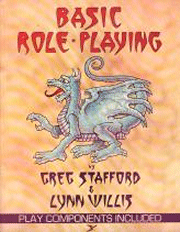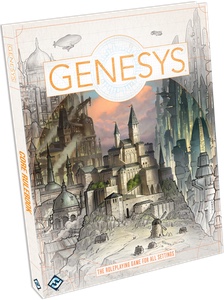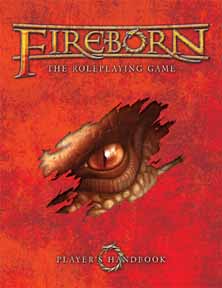
Basic Role-Playing (BRP) is a tabletop role-playing game which originated in the RuneQuest fantasy role-playing game. Chaosium released the BRP standalone booklet in 1980 in the boxed set release of the second edition of RuneQuest. Greg Stafford and Lynn Willis are credited as the authors. Chaosium used the percentile skill-based system as the basis for most of their games, including Call of Cthulhu, Stormbringer, and Elfquest.

Call of Cthulhu is a horror fiction role-playing game based on H. P. Lovecraft's story of the same name and the associated Cthulhu Mythos. The game, often abbreviated as CoC, is published by Chaosium; it was first released in 1981 and is in its seventh edition, with licensed foreign language editions available as well. Its game system is based on Chaosium's Basic Role-Playing (BRP) with additions for the horror genre. These include special rules for sanity and luck.
Rolemaster is an extremely complex fantasy tabletop role-playing game published by Iron Crown Enterprises in 1980. The game system has undergone several revisions and editions since then.
The d20 System is a role-playing game system published in 2000 by Wizards of the Coast, originally developed for the 3rd edition of Dungeons & Dragons. The system is named after the 20-sided dice which are central to the core mechanics of many actions in the game.

Legend of the Five Rings is a fictional setting created by John Zinser, Dave Seay, Ryan Dancey, Dave Williams, DJ Trindle, Matt Wilson and John Wick and first published by a joint venture between Alderac Entertainment Group and ISOMEDIA in 1995. The setting primarily involves the fictional empire of Rokugan, though some additional areas and cultures have been discussed. Rokugan is based roughly on feudal Japan with influences from other East Asian cultures such as China, Mongolia and Korea. This setting is the basis for the Legend of the Five Rings Collectible Card Game as well as the Legend of the Five Rings Roleplaying Game. Legend of the Five Rings was also the "featured campaign setting" of the Oriental Adventures expansion to the third edition of Dungeons & Dragons, though this book is now out of print.

d20 Modern is a modern fantasy role-playing game system designed by Bill Slavicsek, Jeff Grubb, Rich Redman, and Charles Ryan. The system's core rulebook was published by Wizards of the Coast on November 1, 2002; by 2006, ten additional supplements were released. The game is based on the d20 System and the Dungeons & Dragons 3rd Edition ruleset. It includes various campaign settings along with the tools to build campaigns in modern/contemporary settings.

Guardians of Order was a Canadian company founded in 1996 by Mark C. MacKinnon in Guelph, Ontario. The company's business output consisted of role-playing games (RPGs). Their first game is the anime inspired Big Eyes, Small Mouth. In 2006 Guardians of Order ceased operations due to overwhelming debt.

Atlantis is a fantasy role-playing game (RPG) originally published by Bard Games, set in the ancient world before Atlantis sank. It first consisted of three books: The Arcanum, The Lexicon, and The Bestiary, and for this reason was originally called The Atlantean Trilogy or The Atlantis Trilogy.

Green Ronin Publishing is an American company based in Seattle, Washington. Founded in 2000 by Chris Pramas and Nicole Lindroos, they have published several role-playing game–related products. They won several awards for their games including multiple Origins, ENnie, Pen & Paper, and Inquest Fan Awards.

Spycraft is a d20 and OGL-based role-playing game dealing with superspies and modern action. Originally published by the Alderac Entertainment Group (AEG), it is currently published under licence by Crafty Games.

The history of role-playing games begins with an earlier tradition of role-playing, which combined with the rulesets of fantasy wargames in the 1970s to give rise to the modern role-playing game. A role-playing game (RPG) is a type of game in which the participants assume the roles of characters and collaboratively create stories. Traditionally all the participants but one take on characters and determine the actions of their characters based on their characterization and the actions succeed or fail according to a system of rules and guidelines, and one of the participants takes on the role of game master who narrates the story, plays all the non-player characters and determine the challenge rating and the outcome of various actions. Within the rules, the participants may improvise freely; their choices shape the direction and outcome of the games.

The Legend of the Five Rings Roleplaying Game is a role-playing game originally written by John Wick and published by Alderac Entertainment Group, under license from Five Rings Publishing Group, in 1997. The game uses the Legend of the Five Rings setting, primarily the nation of Rokugan, which is based on feudal Japan with influences from other East Asian cultures.

True20 is a role-playing game system designed by Steve Kenson and published by Green Ronin Publishing. The system was first published as a part of the Blue Rose RPG before being published as a standalone universal generic role-playing game, True20 Adventure Roleplaying.

Ptolus, subtitled "Monte Cook's City by the Spire", is a fantasy role-playing game campaign setting published by Malhavoc Press in 2006 that details a single city and the dungeons that lie beneath it. Ptolus uses the rules of the third edition of Dungeons & Dragons — the d20 System — under the terms of Wizards of the Coast's Open Game License. At 672 pages, it was the largest D&D supplement that had been published up to that time.

Grimm is a role-playing game, released by Fantasy Flight Games. The current version is a standalone game using the Linear D6 system. The Linear D6 version is a significant expansion of the original material, including a more fully developed setting, a monster manual and game mechanics, all of which were previously provided by the core D20 System rule books.

The Pathfinder Roleplaying Game is a fantasy role-playing game (RPG) that was published in 2009 by Paizo Publishing. The first edition extends and modifies the System Reference Document (SRD) based on the revised 3rd edition Dungeons & Dragons (D&D) published by Wizards of the Coast under the Open Game License (OGL) and is intended to be backward-compatible with that edition.

A tabletop role-playing game, also known as a pen-and-paper role-playing game, is a classification for a role-playing game (RPG) in which the participants describe their characters' actions through speech, and sometimes movements. Participants determine the actions of their characters based on their characterization, and the actions succeed or fail according to a set formal system of rules and guidelines, usually containing Dice-Rolling. Within the rules, players have the freedom to improvise; their choices shape the direction and outcome of the game.
The Star Wars Roleplaying Game is a tabletop role-playing game set in the Star Wars universe, first published by Fantasy Flight Games in 2012. It consists of different standalone cross-compatible games where each one is a separate themed experience. The sourcebooks support games set from the Clone Wars era to the original Star Wars trilogy era; there is limited support for the Star Wars sequel trilogy era. Since 2020, the game line has been maintained by Asmodee's subsidiary Edge Studio.
Free RPG Day is an annual promotional event by the Tabletop role-playing game industry. The event rules are fairly simple: participating publishers provide special free copies of games to participating game stores; the game store agrees to provide one free game to any person who requests a free game on Free RPG Day.

The Genesys Roleplaying Game is a tabletop role-playing game released by Fantasy Flight Games in November 2017. The book presents a generic version of a narrative dice system introduced previously in Fantasy Flight Games' Star Wars RPG, opening the system to be used in any type of setting.















